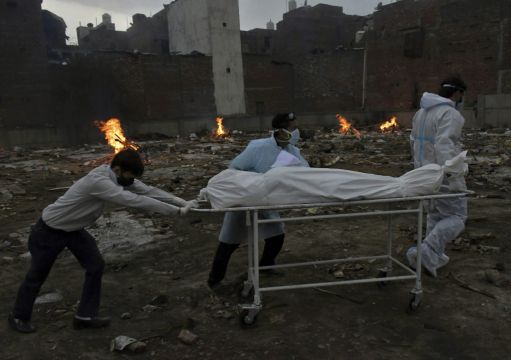Indian prime minister Narendra Modi is facing growing pressure to impose a strict nationwide lockdown, despite the economic pain it will exact, as a surge in coronavirus cases hammers the country’s health system.
Many medical experts, opposition leaders and even Supreme Court judges are calling for national restrictions, arguing that a patchwork of state rules is insufficient to quell the rise in infections.
TV stations broadcast images of patients lying on stretchers outside hospitals waiting to be admitted, with hospital beds and critical oxygen in short supply.

People infected with Covid-19 in villages are being treated in makeshift outdoor clinics, with IV drips hanging from trees.
As deaths soar, crematoriums and burial grounds have been swamped with bodies, and relatives often wait hours to perform the last rites for their loved ones.
The situation is so dramatic that those calling for a strict lockdown include merchants who know their businesses will be affected but see no other way out.
India’s surge has served as a warning to other countries with fragile health systems — and also has weighed heavily on global efforts to end the pandemic since the country is a major vaccine producer but has been forced to delay exports of jabs.

Infections have swelled in India since February in a disastrous turn blamed on more contagious variants as well as government decisions to allow massive crowds to gather for religious festivals and political rallies.
On Friday India reported a new daily record of 414,188 confirmed cases and 3,915 additional deaths. The official daily death count has stayed over 3,000 for the past 10 days.
That takes the total to more than 21.4 million Covid-19 infections and over 234,000 deaths, and experts say those are undercounts.
Over the past month, nearly a dozen of India’s 28 federal states have announced some restrictions, but they fall short of a nationwide lockdown imposed last year that experts credit with helping to contain the virus for a time.

Those measures, which lasted two months, included stay-at-home orders, a ban on international and domestic flights and a suspension of passenger services on the nation’s extensive rail system.
The government provided free wheat, rice and lentils to the poorest for nearly a year and also small cash payments, while Mr Modi also vowed an economic relief package, but the lockdown, imposed at four hours’ notice, also stranded tens of millions of migrant workers who were left jobless and fled to villages, with many dying on the way.
The national restrictions caused the economy to contract by 23% in the second quarter last year, though a strong recovery was under way before infections rocketed recently.
Mr Modi has so far left the responsibility for fighting the virus in the current surge to poorly equipped state governments and faced accusations of doing too little.

His government has countered it is doing everything it can, amid a “once-in-a-century crisis”.
Amid a shortage of oxygen, the Supreme Court has stepped in. It ordered the federal government to increase the supply of medical oxygen to New Delhi after 12 Covid-19 patients died last week when a hospital ran out of supplies for 80 minutes.
Three justices called on the government this week to impose a lockdown, including a ban on mass gatherings, in the “interest of public welfare”.
Dr Randeep Guleria, a government health expert, said he believes a total lockdown is needed like last year, especially in areas where more than 10% of those tested have contracted Covid-19.
Rahul Gandhi, an opposition Congress party leader, in a letter to Mr Modi on Friday, also demanded a total lockdown and government support to feed the poor, warning “the human cost will result in many more tragic consequences for our people”.







